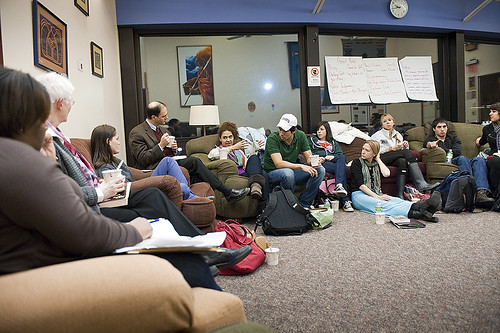After a year of research and careful consideration, 51łÔąĎÍř has put into place a new student sexual misconduct policy that more clearly defines prohibited behaviors and also emphasizes the responsibility of all parties to express their consent.
Students are learning about the new policy, as well as the channels for reporting violations, through a series of mandatory training workshops.
A few hundred students have attended so far, and more than 20 additional sessions are scheduled for the next few weeks.
“The questions have been thoughtful and nuanced, and the conversations very productive,” said Kim Taylor, dean of the sophomore-year experience.
Taylor serves as a harassment advisor and is co-facilitating the training program. “These sessions are just the beginning of many conversations we will be having about healthy sexuality on campus.”
 |
| Students take part in a non-credit class called Yes Means Yes, which looks broadly at sexuality at 51łÔąĎÍř and in general. (Photo by Andy Daddio) |
In addition to the student sessions, some members of the faculty, administration, and staff are participating in first-responder trainings in case a student comes to them before officially reporting a problem.
“We’re out to educate people about what exactly misconduct is,” said Marilyn (Lyn) Rugg, professor of Romance languages and literature and the university’s harassment officer.
The policy, which involves student interactions with other students, explicitly defines two categories of sexual misconduct as well as sexual exploitation. It deliberately stops short of attaching sanctions because, Rugg said, “We wanted a policy that could work for every case and not hamstring the process.”
According to the policy, the distinction between acceptable and unacceptable conduct lies in the notion of mutual respect and clear consent, which can be blurred by the use of alcohol or drugs.
“However,” the policy states, “being under the influence of alcohol or drugs is not a defense to an allegation of sexual misconduct or sexual harassment.”
In addition to explaining the new policy, Rugg hopes the trainings also will foster a stronger buddy system on campus. “What I want is to empower people, men and women, so that if they are somewhere and they see someone drinking too much or being taken advantage of, they will step up,” she said.
Consent is also one of the subjects of a five-week non-credit class called Yes Means Yes, which looks broadly at sexuality at 51łÔąĎÍř and in general.
Developed from a senior thesis by Jaclyn Berger ’09 and supported by 51łÔąĎÍř’s Wellness Initiative, the class is facilitated by Dawn LaFrance, associate director of 51łÔąĎÍř’s counseling center, and other staff and faculty.
“The policy brings up a lot of new issues,” said Nick Mitilenes ’10, who is a peer counselor, president of the Intrafraternity Council, and on 51łÔąĎÍř’s conduct board. “You could have cases where a person thinks they got consent, but maybe they didn’t.”
Molly Kunzman ’12, a leader in Gamma Phi Beta, agreed. “For me the scariest part is not that someone will take advantage of another person, but that when people drink too much there are two people who might both be in an unhealthy place.”
Next month, her sorority will hold a joint training with the members of Sigma Chi fraternity.
“Even if now it feels confusing, the administration wants everyone to know that they have options if something happens to them,” said Kunzman.